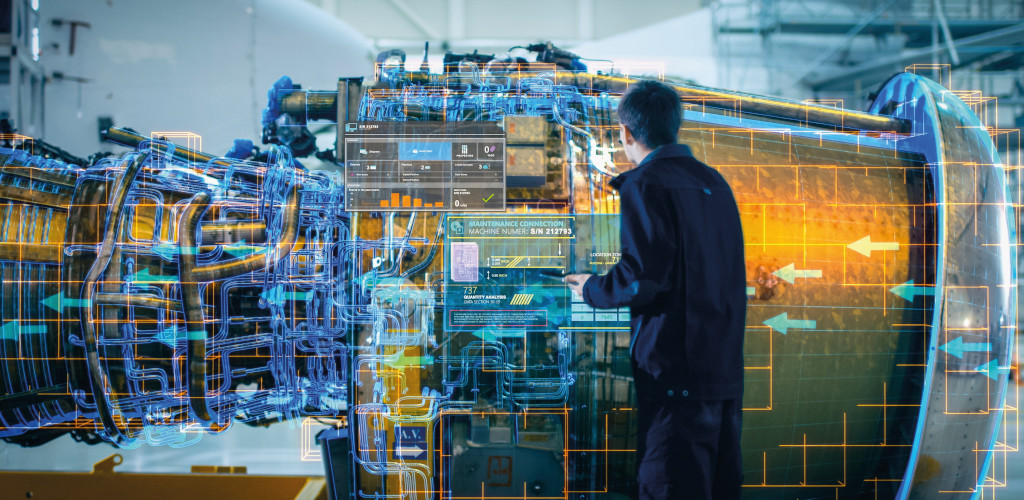Jul 24 | 2023
Human Flexibility Will Still be Important as AI Gains Ground

By Yossi Sheffi
In a thought-provoking leader from Issue 4 of Breakbulk Magazine, Dr Yossi Sheffi looks at how breakbulk logistics should embrace artificial intelligence, and how implementation of the technology could unleash a multitude of new jobs in the sector.
 Fears that AI-driven technology will replace humans in countless jobs are well-founded. This is especially the case in industries such as breakbulk cargo logistics, which are relatively labor-intensive. However, there are two critically important caveats to this worrisome scenario.
Fears that AI-driven technology will replace humans in countless jobs are well-founded. This is especially the case in industries such as breakbulk cargo logistics, which are relatively labor-intensive. However, there are two critically important caveats to this worrisome scenario.First, industrial revolutions such as the one we are now experiencing also create countless employment opportunities. Second, despite AI’s incredible capabilities, it cannot match the flexibility of humans in the workplace.
It is impossible to accurately predict the types of jobs that AI will create because these employment opportunities are undefined. But history teaches us that waves of innovation unleash bounties of new jobs.
An example in the logistics space is the advent of containerization. The concept of carrying cargo in standardized boxes transformed world trade after it became a force for global change in the 1950s. Initially, this revolution in cargo carrying eliminated many jobs because much of the back-breaking work associated with the manual unloading and loading of vessels was mechanized.
However, as the revolution gathered steam, it became necessary to mass-produce steel boxes and to maintain and improve their design. Also, switching to standard cargo units opened new ways to improve the efficiency of supply chains. These changes created jobs in manufacturing, cargo operations, and associated fields such as data analytics and demand forecasting. It should also be noted that containerization increased global trade volumes, subsequently stimulating growth not only in international supply chain management but also in allied industries such as international tourism.
AI will have a similar influence on industries such as breakbulk logistics as the application of algorithms improves and becomes better understood. The impact will vary depending on the nature and size of the industry, but AI-driven innovation will extend to job markets.
Moreover, the value of human flexibility will not diminish as AI gains ground, ensuring that people do not disappear from the workplace. This is often overlooked or underestimated in discussions about the future of work. The flexibility of human workers comes in various forms.
Real-world Experience
A lifetime of experience in the physical world allows people to detect changes or discrepancies between normal and abnormal situations. For example, during the financial crisis in 2008, companies worried about the financial health of their suppliers.
Many companies asked for economic data from suppliers, but these numbers could be manipulated and only provided a lagging, infrequently updated view of conditions at the supplier. To augment the data, companies sent people to spot-check critical suppliers’ production of parts or materials on behalf of the company.
Many work tasks involve value judgments and subjective elements based on the system designer’s or manager’s preferences. However, objectives, moral understandings, and preferences change over time. While machines may be able, if appropriately trained, to sift through large amounts of data and present options for actions, people must make the ultimate decisions in cases where the implications matter.
This is especially true when the context changes and decisions must be made in a different environment. For example, when prioritizing the response to a disaster, should preference be given to customers, employees, suppliers, shareholders, or the community? The honest answer is “it depends” on the nature of the event and the context, which are difficult to program or train a model.
People are more adaptable than robots when faced with unstructured conditions and environments. Robotic software systems are built and optimized for specific tasks or domains.
However, change (disruptions, new knowledge, new products, competitors’ actions, economic cycles, etc.) can render the machine’s appropriateness moot, requiring a person to take over the task. Also, social networks are adept at creating new corporate organizational structures to manage change. This has happened in response to numerous disruptions over recent years, such as the 2011 earthquake in Japan and the Covid-19 pandemic.
Change that requires adaptation is built into many consumer and technology supply chains, such as fast fashion. These fast-moving supply chains search ceaselessly for differentiation that can spur demand for any new product or service. People, not machines, are part of a cultural milieu that stimulates creativity. Also, humans understand the vagaries of everyday life, and this hands-on experience creates possibilities for new products and services.
Empathy and Communication
While a growing number of AI applications are used in health care, computers cannot show the empathy required of a nurse while treating a patient. Likewise, a machine cannot replace the smile of a service worker, such as a cashier in a local supermarket.
Similarly, procurement contract negotiations cannot occur without both sides understanding each other, developing rapport, and appreciating each other’s points of view. Even though algorithms that mimic these qualities are becoming increasingly sophisticated, it isn’t easy to imagine absolute acceptance of machine-generated, simulated emotions and empathy.
While rules can be programmed based on different contexts, the most appropriate choice in a situation that requires a company to select a way forward may differ from the one suggested by the rules. For example, if the company suspects that a recession is on the horizon, it may prefer the safer course of action rather than the high-risk/high reward. Humans are used to taking such nuances into account when making decisions.
Importantly, awareness of the opportunities AI and related technologies will bring to the workplace is insufficient.
To take full advantage of these changes, we must prepare employees with education and training platforms that enable them to acquire and update the skills they will need going forward. In the logistics workplace of the future, people will be required to work with automated, AI-enhanced systems and processes to maintain and improve supply chain performance.
Dr Yossi Sheffi is the Elisha Gray II Professor of Engineering Systems at the Massachusetts Institute of Technology and director of the MIT Center for Transportation and Logistics. Visit sheffi.mit.edu/magicbelt for details of his recent book, “The Magic Conveyor Belt: Supply Chains, A.I., and the Future of Work”.
